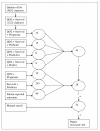Quality of life data as prognostic indicators of survival in cancer patients: an overview of the literature from 1982 to 2008
- PMID: 20030832
- PMCID: PMC2805623
- DOI: 10.1186/1477-7525-7-102
Quality of life data as prognostic indicators of survival in cancer patients: an overview of the literature from 1982 to 2008
Abstract
Background: Health-related quality of life and survival are two important outcome measures in cancer research and practice. The aim of this paper is to examine the relationship between quality of life data and survival time in cancer patients.
Methods: A review was undertaken of all the full publications in the English language biomedical journals between 1982 and 2008. The search was limited to cancer, and included the combination of keywords 'quality of life', 'patient reported-outcomes' 'prognostic', 'predictor', 'predictive' and 'survival' that appeared in the titles of the publications. In addition, each study was examined to ensure that it used multivariate analysis. Purely psychological studies were excluded. A manual search was also performed to include additional papers of potential interest.
Results: A total of 451 citations were identified in this rapid and systematic review of the literature. Of these, 104 citations on the relationship between quality of life and survival were found to be relevant and were further examined. The findings are summarized under different headings: heterogeneous samples of cancer patients, lung cancer, breast cancer, gastro-oesophageal cancers, colorectal cancer, head and neck cancer, melanoma and other cancers. With few exceptions, the findings showed that quality of life data or some aspects of quality of life measures were significant independent predictors of survival duration. Global quality of life, functioning domains and symptom scores - such as appetite loss, fatigue and pain - were the most important indicators, individually or in combination, for predicting survival times in cancer patients after adjusting for one or more demographic and known clinical prognostic factors.
Conclusion: This review provides evidence for a positive relationship between quality of life data or some quality of life measures and the survival duration of cancer patients. Pre-treatment (baseline) quality of life data appeared to provide the most reliable information for helping clinicians to establish prognostic criteria for treating their cancer patients. It is recommended that future studies should use valid instruments, apply sound methodological approaches and adequate multivariate statistical analyses adjusted for socio-demographic characteristics and known clinical prognostic factors with a satisfactory validation strategy. This strategy is likely to yield more accurate and specific quality of life-related prognostic variables for specific cancers.
Figures
References
-
- Trask PC, Hsu MA, McQuellon R. Other paradigms: health-related quality of life as a measure in cancer treatment: its importance and relevance. Cancer J. 2009;15:435–440. - PubMed
-
- Quinten C, Coens C, Mauer M, Comte S, Sprangers MA, Cleeland C, Osoba D, Bjordal K, Bottomley A. EORTC Clinical Groups. Baseline quality of life as a prognostic indicator of survival: a meta-analysis of individual patient data from EORTC clinical trials. Lancet Oncol. 2009;10:865–871. doi: 10.1016/S1470-2045(09)70200-1. - DOI - PubMed
Publication types
MeSH terms
LinkOut - more resources
Full Text Sources
Other Literature Sources
Medical


